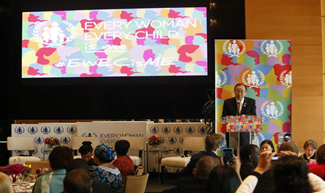Simplifying a message has never been more important. Especially for those who advocate for better global health and development. We are at a turning point, the end of the Millennium Development Goals (MDGs) and the adoption of a new agenda to end extreme poverty by 2030. The new global goals will be approved in September at the United Nations.
September will also mark the launch of the updated Global Strategy for Women's, Children's, and Adolescents' Health (Global Strategy). The original strategy was developed in 2010, and has galvanized action from over 300 partners making 400 commitments to support Every Woman Every Child, the UN Secretary-General's women's and children's health initiative. The next set of global goals and the updated Global Strategy are two important agendas that require the highest levels of political will for their adoption, and more importantly their implementation.
That's why I am pleased to be part of the campaigns #GlobalGoalsWork and #EWECisME.
Starting with #GlobalGoalsWork, the UN Foundation, Devex and Fenton got together to focus on the added value of global goals. Before we can agree on a new agenda we must first know where we are coming from. The series promotes the significant results toward achieving the MDGs, and the essential contributions made by the United States to accelerate global progress. #GlobalGoalsWork takes place during the month of May and was kicked off with a video interview by Tony Pipa, the U.S. special coordinator for the post-2015 development agenda. A toolkit of data points and messaging can be found here. Advocates in the global development space are encouraged to integrate key messages and to help build the fundamental case for why global goals matter.
The second effort, which was launched on May 14 by the UN Secretary-General (UNSG), is a campaign to show support for the next Global Strategy. Every Woman Every Child is ME, known by its hashtag #EWECisME, builds off the name of the successful movement, and offers advocates a platform to personalize women's and children's health. At the launch, global leaders held placards to support the campaign and recorded video clips (coming soon to everywomaneverychild.org).
In his prepared remarks, the UNSG issued a Call to Action:
Now is the time to renew our pledge to every woman, every child -- everywhere.
Let us remember, we are all accountable to Every Woman Every Child.
Every Woman Every Child is a health worker going the extra mile to save a life.
It is a politician, a business person, it is an educator.
It is your mother or father, brother or sister.
Every Woman Every Child is all of us.
Every Woman Every Child is ME.
The UNSG then talked about his own history growing up in South Korea and losing two siblings. His personal connection offered a human face to the vision of ending preventable deaths of women, children, and adolescents'. Personalized narratives will help build broader support and increase political will to get across the finish line. And let's be clear, the marathon is not over in September, but when we end preventable deaths in our lifetime.
That brings me to a Call to Action for advocates and communicators. How do we simplify, humanize, and integrate messaging across sectors? And, particularly, how do we better link ending extreme poverty to the actions needed to address climate change? We need new ways of communicating the investment case to unpack a complex development agenda. Working together, I am confident we will be able to end extreme poverty. And when we do, it will be the greatest accomplishment of our generation, within a generation.

